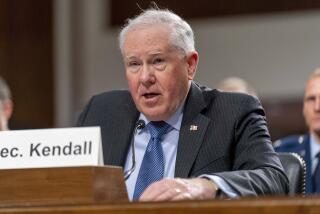More Secrecy Sought in Alerts to Airlines : Skinner Says He’ll Not Tell Congress to Avoid Leaks
- Share via
LONDON — U.S. Transportation Secretary Samuel K. Skinner said today he will no longer tell Congress about airline security alerts for fear of leaks and is considering a bill to make unauthorized disclosure a crime.
Skinner also said that passengers on U.S. airlines may be barred from taking electronic devices such as portable computers on aircraft following the Pan Am Flight 103 air disaster over Scotland.
Speaking to American reporters in London on the last leg of a five-nation European tour, Skinner said he was adamant about not discussing publicly intelligence-gathering or unannounced airline security bulletins.
‘Protect That Information’
“I have just sent a letter to the U.S. Congress advising them that I will no longer disseminate information to them regarding security bulletins until I am absolutely sure that they have a mechanism in place to protect that information,” he said.
He said he plans new regulations about leaking airline “security-type information,” adding: “I may seek legislation making it a crime.”
Last month, Skinner criticized a London newspaper, the Daily Express, which reported a security bulletin sent by the U.S. Federal Aviation Administration to airports and carriers March 16 about a possible hijacking of an American airliner in Europe.
Skinner said public disclosure of all warnings would mean they would be taken for granted.
After the Pan Am disaster, British Transport Secretary Paul Channon was accused by critics in Britain of bungling the dissemination to airlines of warnings from West Germany that Palestinian terrorists had devised a new radio cassette bomb.
Flight 103, bound for New York from Frankfurt via London, was blown apart by a tiny bomb hidden in a radio cassette recorder. It crashed on the Scottish village of Lockerbie, killing 270 people.
Skinner, who met Channon later today, also said he expects the latest U.S. bomb-detection equipment, thermal neutron analysis, to be installed at several European airports by year’s end. The machines can find plastic explosives missed by X-rays.
In a $60-million program, the United States accelerated development of thermal neutron analysis after the Flight 103 disaster Dec. 21. The first device is due to be installed at New York’s John F. Kennedy Airport in July.
More to Read
Sign up for Essential California
The most important California stories and recommendations in your inbox every morning.
You may occasionally receive promotional content from the Los Angeles Times.













